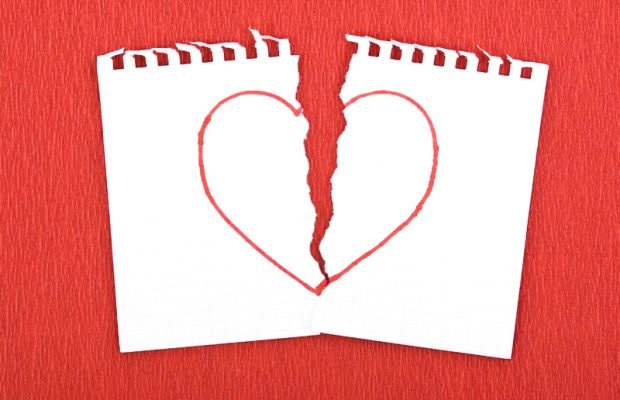Dealing with a broken heart is no fun to begin with . . . but going through heartbreak during a health pandemic when you can’t even surround yourself with friends can make the whole thing feel even more soul crushing that it already is.
A broken heart is unlike any other pain. It’s emotional, psychological . . . and can sometimes physically hurt (from the inside out) — it’s like it can hurt worse than a broken bone.
It is OK to cry . . . One thing that might help is to cry it out. Let yourself feel the pain and grieve the death of your relationship. There is no need to put on a brave face and pretend you are “fine” when in reality you are so totally not fine. You are allowed to feel your feelings and wallow in your truth if you are hurting.
You had your heart broken and that hurts!
It is OK to feel sad and mad, maybe even confused and/or disappointed. You just lost something and not it feels like that something was a piece of yourself.
Seriously, it is alright to cry, and cry a lot. You are allowed to. Full permission has been granted. It is OK to lose it in the privacy of your own home. With the whole social distancing thing going on, there’s no need to fear losing it in public. Get it all out at home if crying is what your heart needs right now.
Once you are all cried out, it will be easier to move onto the healing process.
If you don’t actually need to cry, that’s OK. If you cry once and then already feel better, then that’s great, too. If you feel the need to wallow and continue to grieve the death of your relationship for the next two weeks, go ahead. But two weeks should be the limit. After that, there is nothing new to cry over that you haven’t bawled your eyes out over already.
Yes, it hurts like crazy right now, but it will not be this painful forever.
Go ahead and allow yourself to forget about it . . . Forgetting the past can be incredibly helpful in letting you move on to your future. No . . . not forever, just for now.
When we are still dwelling in the darkest days of heartbreak, it’s easy to sometimes get so focused on the past that we stop living our present reality.
It is easy to want to play and replay the relationship, over and over and over again, in our heads. We almost become obsessed with what happened, what didn’t happen, what could have happened, what should have happened, and then we get so worked up over the past, it feels almost impossible to move forward.
It’s normal to feel this way. It’s also normal if you don’t feel this way. It is OK to not be OK and it is OK to be OK.
Many of us may tend to over-analyze ad nauseam, but doing so has the power to become a dangerous coping method that will make the heartache last longer and postpone the whole healing process.
Look forward to all of the positive ways your life will change . . . like, more time to be with friends (once the social distancing thing is over and the health crisis has come to an end), hobbies or activities you once loved but took a backseat to your relationship, or even discovering new hobbies you didn’t realize you would love.
You are not forgetting the past forever, just for now. One day you will be able to look back at this past relationship and remember it fondly without any pain (unless you escaped a truly abusive relationship), and you will come to realize how strong you truly are now that you are no longer in that relationship.
Call on your friends . . . Alright, so you can’t get out and be with your friends in person right now (you know, social distancing and all), but you can still reach out to them.
Your heart has been wounded and it might feel like a ton of bricks have hit you straight in the gut, like you just had your soul shattered . . . but leaning on friends can still help, even if it is over the phone or in a virtual setting.
You don’t truly have to go through this whole thing alone. Call up a friend or two and talk about what you are going through and how you are feeling. Putting it all out there in a verbal way helps to alleviate some of the emotions that have been building up inside you. It will help ease your mind and let go of some of that hurt.
Ask your friend to be the ear to vent to, your go-to person if for the next two weeks, or you can even ask a couple friends so you have a team around you for when someone may not be available.
Set a deadline on the whole venting process, though, two weeks should be the limit because once you’ve reached that point (a lot like crying it out) there is nothing new to say about the relationship or breakup after that point.
It’s not that you should never talk about the relationship again, but after two weeks don’t let that be the only topic you are capable of discussing. Of course, the two week rule is adaptable for super long-term relationships.
Just be sure to pay your friend (or friends back) when or if they need someone to be their go-to person down the road as well.
Try some distractions . . . The tears are done flowing and the initial shock of the relationship is over, now it’s time for some distractions.
Distractions will make you feel busy and productive instead of focusing on your loss, until you have come to truly accept the loss. Be productive . . . get some exercise at home or get out in nature (just keep your distance from others) . . . dance it out, shake it out, pump up some feel good happy tunes (no sappy love songs allowed) — be silly, get funky and sing along at the top of your lungs . . . clean out or organize your closet, bathroom, home . . . etc.
Get your friends on a multi-person facetime or Zoom (or whatever) and play some games, have a virtual dance party, initiate a book or movie club. You can even cook together while seperately in your own homes or order take-out/delivery and have dinner together while still keeping your distance to talk things out.
You don’t have to go through this alone, even though you may feel extra alone during the COVID-19 health pandemic.
For the latest information on the Coronavirus and updates from health officials, we have you covered.











